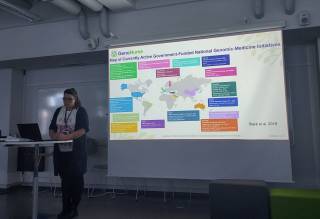Teachers are experts in their own subject and the pedagogical field. The development process towards expertise is long and gradual; yet, the acquired competences are not permanent qualities. Competences must be maintained and further developed. In the era of genomic health care, the benefits and opportunities that genomics offers need to be addressed in the education of health care professionals to increase their level of knowledge, understanding and genomic literacy. The field of genomics has added new information to diagnostics, individualized health care, safe medication, targeted screening, and effective disease prevention. Transition from genetics to genomics has broadened the field from rare single-gene-diseases to common multifactoral diseases. This, in turn, has triggered the need for nurses at every level and in every sector of health care to understand and be able to implement genomic information in their work with patients. These developments in medicine and nursing are also reflected in the teaching of health care professionals.
 The main aim of teacher pilots is to build understanding and competence in genomic informed nursing care. This enables nursing and healthcare teachers to be able to facilitate and teach nursing subjects by utilizing active and online learning methods. For this first teacher pilot, we specified as our aim to improve knowledge, competence, and confidence of faculty to educate nursing and healthcare students in genomics enhanced oncology. In oncology, genomic information has been used for the longest time both in cancer prevention and in its treatments. Therefore, we chose cancer as an example for the first pilot.
The main aim of teacher pilots is to build understanding and competence in genomic informed nursing care. This enables nursing and healthcare teachers to be able to facilitate and teach nursing subjects by utilizing active and online learning methods. For this first teacher pilot, we specified as our aim to improve knowledge, competence, and confidence of faculty to educate nursing and healthcare students in genomics enhanced oncology. In oncology, genomic information has been used for the longest time both in cancer prevention and in its treatments. Therefore, we chose cancer as an example for the first pilot.
Another aim was to inspire teachers to use storytelling as a pedagogical method in their teaching. The method of storytelling is based on the use of patients’ stories in teaching. Humanity has a long history with storytelling. Stories appeal to us. In the context of teaching, they can be used as a form of simulation training. A patient’s story provides an excellent context for students to gain practical insight into the importance of why they need to have an understanding of the topic and be able to provide genomics informed nursing care. Patients’ stories are captivating and powerful. They frequently cover a long period of time and a lot of detail. These can be used to draw out themes that can then be utilized in styding topics further. In our pilot, we provided our attendeed with a patient story to read. We then provided the attendees with questions about different pedagogical approaches and brainstormed ideas on how these could be applied in practice.
Following the pilot, we sent our attendees a short survey to find out their thoughts about the content of the pilot. Some challenges were identified related to the two-hour teacher training workshop. These are described in the table below.
Confronted Challenges:
- Faculty willingness to take part
- Technical issues
- To meet face to face in classroom instead of being online
- To activate discussion
- Hybrid pedagogics
We will continue to collect feedback following each of our pilots. This will be analysed and utilised to inform the next pilot cycle – to improve it. Through our pilots, our ultimate aim is to build a tested model for teaching, and thus, activate health faculties around Europe to improve the education of the genomic informed nursing.
Join GenoNurse community to collaborate with us!

Comments